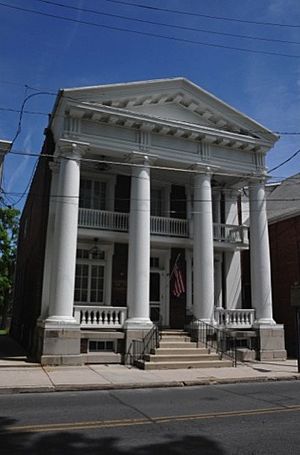Camp Colt, Pennsylvania facts for kids
Quick facts for kids Camp Colt |
|
|---|---|
| Part of United States Army | |
| Gettysburg Battlefield, Adams County, Pennsylvania |
|

House Captain Eisenhower lived in at Camp Colt in 1918
|
|
| Type | Tank Corps recruit training |
| Site information | |
| Controlled by | National Park Service |
| Open to the public |
1 commemorative tablet at Memorial Pine Tree, 1 display with images |
| Site history | |
| In use | 1918–1919 |
| Demolished | 1919, Lewis Wrecking Co |
| Events | 1918 flu pandemic First Transcontinental Motor Convoy (1919) |
| Garrison information | |
| Past commanders |
Dwight D. Eisenhower |
Camp Colt was a special military base near Gettysburg, Pennsylvania. It was the first place in the United States to train soldiers to use tanks during World War I. The camp was set up on the historic Gettysburg Battlefield, a famous site from the American Civil War.
Camp Colt opened in March 1918. Its main training area was in the fields where Pickett's Charge happened in 1863. This was a very important battle during the Civil War. The camp's first commander was Captain Dwight D. Eisenhower. He later became a famous general and then the President of the United States! Eisenhower earned a higher rank, Major, and a special medal for his hard work at Camp Colt. He and his wife, Mamie, loved the Gettysburg area so much that they made their home there after he retired from the military.
Contents
What Was Camp Colt For?
Camp Colt was created to get soldiers ready for tank warfare. Tanks were a new and powerful weapon in World War I. Soldiers needed special training to drive and fight with them. The camp prepared these "tank soldiers" to go overseas. They would get their final training in England and France before joining the fight.
Life and Training at Camp Colt
Life at Camp Colt was busy and sometimes tough. Soldiers arrived from all over the country. In March 1918, about 1,000 troops were at the camp. They learned how to operate the new tanks. The camp even got its first Renault light tank from France in June 1918.
The soldiers also had time for fun and community.
- The camp had its own newspaper called Treat 'Em Rough.
- Soldiers participated in sports, like baseball games against local teams.
- They also took part in local events, like the Memorial Day procession to the Gettysburg National Cemetery.
- A "Soldier's Club" was set up in Gettysburg for recreation.
- The local court even held ceremonies at the camp to make new U.S. citizens.
Challenges at Camp Colt
Camp Colt faced several challenges. In April 1918, a huge blizzard covered the camp with two feet of snow! But the biggest challenge was the 1918 flu pandemic. This was a very serious illness that spread quickly.
- In September 1918, the camp had its largest number of soldiers, about 10,600.
- A quarantine was put in place to try and stop the flu from spreading.
- Sadly, over 150 soldiers at Camp Colt died from the flu.
- The illnesses at the camp even led to plans for a new local hospital in Gettysburg.
Eisenhower's Role and Camp Colt's Legacy
Captain Eisenhower was a strong leader at Camp Colt. He was ordered to take his unit to France in November 1918. However, World War I ended with an armistice on November 11, 1918. This meant the war was over, and his unit did not have to go.
Eisenhower's command at Camp Colt ended in November 1918. Many soldiers were transferred to other bases. The camp itself began to close down.
- By April 1919, vehicles from Camp Colt were moved to other military bases.
- In May 1919, the buildings at Camp Colt were sold off.
- Camp Colt officially closed in August 1919.
Even though Camp Colt was only open for a short time, it played an important role. It was the first place to train tank soldiers in the U.S. It also gave Dwight D. Eisenhower his first command. This experience helped him become the great military leader he was.
In August 1919, the First Transcontinental Motor Convoy passed through the former Camp Colt site. This was a long journey across the country by military vehicles. Eisenhower himself joined the convoy for part of this trip.
Years later, in 1932, the first Camp Colt reunion was held. In 1954, a "Memorial Pine Tree" was planted at Gettysburg with a special tablet. This honored Eisenhower and the soldiers who trained at Camp Colt.
Images for kids
 | Lonnie Johnson |
 | Granville Woods |
 | Lewis Howard Latimer |
 | James West |


